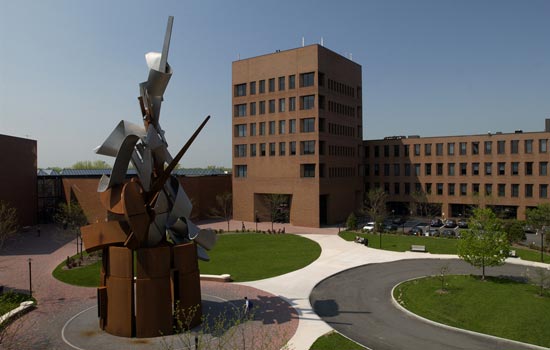RIT launches reaccreditation process
University launches process to gain reaccreditation by 2017
A. Sue Weisler
RIT is working on its 10-year continuous improvement plan with the Middle States Commission on Higher Education.
Rochester Institute of Technology is working on its 10-year continuous improvement plan with the Middle States Commission on Higher Education.
Middle States accreditation assures educational excellence through a robust process of self-study, site visits and peer review. The commission is comprised of more than 500 member institutions from Maryland to New York, where each school must undergo a decennial evaluation to receive or maintain accreditation.
“This is a critical process for RIT and it’s also a real opportunity for us to be introspective and find ways to improve,” said RIT President Bill Destler.
RIT recently adopted “Greatness Through Difference: 2015-2025 Strategic Plan” to establish the vision and mission of the university along with goals and objectives. The accreditation process will use the strategic plan as a guide in the self-study to examine university priorities, assess if RIT is on track and also suggest areas for improvement.
Embracing the importance of accreditation “will ensure that the university is providing a quality education for our students. The review process looks at every single operation of the university with the singular focus of answering the question: How well are we doing what we say we do?” said Jeremy Haefner, provost and senior vice president for academic affairs.
Christine Licata, senior associate provost, is serving as RIT’s accreditation liaison officer. The Steering Committee is co-chaired by Michael Laver, associate professor, College of Liberal Arts, and Anne Wahl, assistant provost for assessment and accreditation. The trio answered the following questions to break down the process:
Question: What is the Middle States Commission on Higher Education?
Answer: The Middle States Commission on Higher Education (MSCHE) is a voluntary organization made up of more than 500 member schools from Maryland to New York and is one of six regional accrediting agencies recognized by the U.S. Department of Education. A school must be accredited from one of these agencies in order to provide federal financial aid to its students, but beyond that, these agencies strive to use peer review and collectively established standards to ensure academic rigor and quality. The whole process of re-accreditation takes roughly two and a half years from start to finish.
Q: What does it mean to be accredited and how does the re-accreditation process happen?
A: The first year of the process is devoted to a robust self-study coordinated by a steering committee. The Steering Committee is responsible for identifying a number of working groups that will each tackle one of the seven standards of accreditation. Guided by research questions and a document library provided by the steering committee, the working groups analyze how well RIT fulfills the criteria that define the standard as well as areas in which RIT can improve. While it’s important to highlight RIT’s many strengths and successes, the MSCHE also expects the self-study to determine areas of potential betterment so as to foster a culture of continuous institutional improvement.
The reports will lead to a site visit in spring 2017 by external peer reviewers assigned by MSCHE. Following the site visit, a report will be submitted to MSCHE and RIT by the external visitation team. MSCHE will then vote on re-accreditation: either to re-accredit without any further action, to re-accredit with stipulation, probationary reaccreditation, or to withdraw accreditation. It’s important to remember that this exercise is not just an attempt to celebrate RIT’s accomplishments, but rather is an opportunity to focus on areas in which RIT can improve.
Q: Is this accreditation process going to be different than 10 years ago?
A: Yes. RIT is part of a Collaborative Implementation Project with MSCHE. MSCHE has streamlined its standards from 14 to seven. MSCHE invited 15 member institutions that are up for reaccreditation in 2017 to participate in the Collaborative Implementation Project. RIT is pleased to participate in this project because it means that MSCHE views RIT as a university in very good standing, and, of course, it allows RIT to be ahead of the curve with the new standards.
Q: What are the seven new standards?
A:
- Mission and goals
- Ethics and integrity
- Design and delivery of the student learning experience
- Support of the student experience
- Education effectiveness and assessment
- Planning, resources and institutional improvement
- Governance, leadership and administration
- To read more details on the standards, visit here: the RIT's MSCHE Accrediation page.
Q: What is the timeline for the process?
A:
- February 2015: Steering Committee work began
- May 2015: Self-study design completed and approved
- September 2015: Working Groups begin their work
- June 2016: First draft of the self study reviewed by the RIT community
- November 2016: Feedback on self-study from Middle States
- February 2017: Final self-study due to Middle States
- April 2017: Middle States site visit
As the process moves forward, members of the RIT community will be able to provide feedback with the Steering Committee. To learn more about RIT’s accreditation process, visit the university’s Middle States website.














